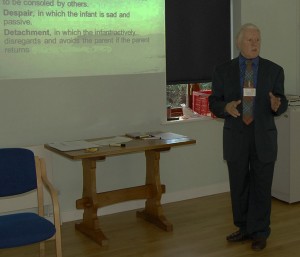Today we looked at factors which affect grief, grief and attachment style, and the nature of complicated grief.
We began the day discussing definitions: Bereavement, Grief, Mourning
We discussed the nature of grief: is it universal across all cultures or culturally determined? We concluded that although grief has universality, culture plays a large part.
Then we looked at two 17th century accounts of grief, a husband’s grief following the sudden death of his wife, and a wife’s grief for her husband executed for treason. We concluded that their grief could equally well be applied to contemporary bereavement.
Then after a break we explored the history of the concept of ‘letting go and moving on’, from Freud and Abraham, through Klein, Bowlby and Parkes.
We explored the factors affecting grief.
In the afternoon we looked at at Hazan and Shaver’s work on adult attachment styles, and the connection between attachment style and grieving patterns; both from Bowlby’s Attachment Trilogy, and in relation to Parkes’ book Love and Loss (2006)
Then we explored the nature of complicated grief, including the controversy around the concept
After an afternoon break we practiced counselling skills.
Student feedback was excellent. They felt that there was plenty of time built in for discussion and questions.
In two weeks’ time: Day 4, we begin to look at current models of grief.
